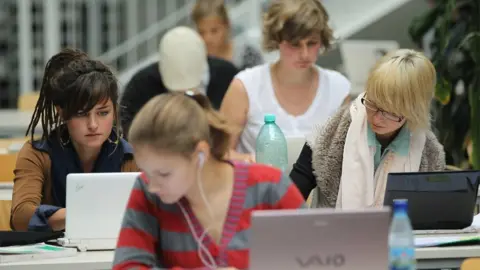Universities 'undermined by overseas autocracies'
 Getty Images
Getty ImagesUniversities in the UK are failing to recognise the seriousness of interference from autocratic countries overseas, a report by MPs says.
The Foreign Affairs Committee warns of a threat to academic freedom, in a report highlighting concerns about the influence of China.
But government advice about the risks has been "non-existent", say MPs.
Tom Tugendhadt, who chairs the committee, called for a defence of "hard-won liberties".
The cross-party House of Commons committee says the government and universities have failed to respond to "mounting evidence" of "autocratic states" trying to undermine academic freedom.
'Financial pressure'
Autocracies are using "financial, political and diplomatic" pressure to try to influence what is taught, researched and discussed on university campuses, it says.
There are more than 100,000 students from China in the UK, the report says.
But while there have been active attempts by universities to recruit students from China, there has been little attention to any security or political implications.
The MPs say there has been "remarkably little debate" about China's influence on universities and research, compared with the US, Australia or New Zealand.
And they highlight concerns from academics about attempts by students from China to "undermine" Hong Kong protesters in London.
 Ben Miskell
Ben MiskellThere were also warnings about co-ordinated efforts to block mentions of "topics sensitive to China", such as Taiwan, Tibet, the 1989 protests in Tiananmen Square or the treatment of Uighur Muslims, and about Chinese students in the UK being put under pressure over their political views.
The report warns of universities, which might benefit financially from recruiting Chinese students, feeling under pressure about who could be invited to speak.
Protecting democracy
It says UK universities receive £1.39bn in research funding from overseas - in addition to tuition fee income from overseas students - but there is no effective check on whether such financial impact could become academic influence.
The MPs' report complains of a lack of response from university representatives and a failure of the Foreign Office to raise awareness of the risks.
"There are strong signs that the Foreign and Commonwealth Office is not treating the issue of interference in academia as the priority it should be," the report says.
A Foreign Office spokesman said universities were expected to continue to uphold the importance of academic freedom - and pointed to a reply in the House of Commons by its minister Andrew Stephenson.
"The UK has a long tradition of protecting human rights domestically and fulfilling our international human rights obligations."
But referring to Mr Tugendhat's warnings, "there are concerns about academic freedoms, particularly given the influence of China, and Russian interference," said Mr Stephenson.
"Those two issues are serious and I know that my right hon. Friend the Foreign Secretary pays close attention to them."
Mr Tugendhat said democracies needed to "protect each other and ourselves in the face of autocratic states who are concentrated on undermining and interfering with hard-won liberties".
"There is a better balance to be found," he said.
"The committee is not blind to the incentives for more students or stronger business links - but this should be weighed with full awareness of the serious risks involved."
Universities UK rejected the idea of there being widespread attempts at interference.
"As autonomous institutions, universities are responsible for developing their own policies and practices for preventing foreign interference," said a spokesman.
"Although there is some limited anecdotal evidence of attempted influence over institutions, any instance that Universities UK is aware of has been firmly rejected. We are unaware of any systematic attempt to interfere with the sector."
